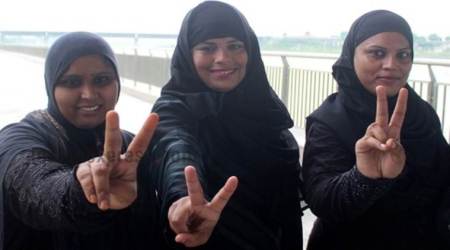 Muslim women celebrating Supreme Court’s verdict on triple talaq. (Express photo by Vishal)
Muslim women celebrating Supreme Court’s verdict on triple talaq. (Express photo by Vishal)
In the history of the Indian Supreme Court, when multi-member benches have decided issues of national or constitutional importance, plurality of opinions is not uncommon, and what the court comes to hold finally on an issue, depends on what the majority of judges say on that specific issue. It is also not uncommon for a particular judge to agree with one set of judges on one issue and another set of judges on an another. Most notable amongst such decisions was the opinion of Justice H.R. Khanna in the 13-judge bench decision in Kesavananda Bharati (1973). Justice Khanna, while agreeing with one set of judges that the power of Parliament to amend is plenary, held that the word amendment itself has inherent and implicit restrictions and thus cannot be used to amend the basic structure of the Constitution, thus agreeing with other six judges and forming a majority that led to the introduction of the “basic structure” doctrine.
The plurality of opinions rendered by five judges of the constitution bench has, in effect, ensured that the agency and rights of Muslim women are protected but at the same time the rights of Muslim minorities with respect to their personal law is not subjected to undesirable and motivated attacks. It is a big victory for Muslim women and Muslim women’s movements who have been fighting to set aside this practice. Most Muslim women’s movements have anchored their opposition to triple talaq on the fact that this practice is un-Quranic and, therefore, considered their challenge as an attempt to reform personal law, rather than efface it. The plurality of opinions rendered by the SC, when read together, do exactly that. The range of arguments put forth in court, from which this plurality arises, indicate a healthy and lively discussion amongst the Muslim community on the issue of talaq-i-bidat.
The order of the court signed by the five judges says: “In view of the different opinions recorded, by a majority of 3:2 the practice of ‘talaq-e-bidat’ — triple talaq is set aside.” It is important to note that the majority decision is only to set aside talaq-i-bidat and not to set it aside as unconstitutional. This is because only Justice Nariman and Justice Lalit — two of the five judges — have held the practice to be arbitrary and therefore violative of Article 14 of the Indian Constitution. The third judge who agrees to set aside the practice seeks to do so on completely different grounds. Justice Joseph holds that after the introduction of Section 2 of the Shariat Application Act, 1937, which made Muslim personal law (shariat) as the “rule of decision” where the parties were Muslims, “no practice against the tenets of Quran are permissible” and talaq-i-bidat, which is not permitted by the Quran is not part of shariat and consequently not applicable to Muslims in India.
Thus, while three judges agreed to set-aside the practice of talaq-i-bidat, they have chosen to do so on very different sets of reasons. This departure of Justice Joseph becomes extremely consequential, in light of his other finding that “In that view of the matter, I wholly agree with the learned Chief Justice that the 1937 Act is not a legislation regulating talaq. Consequently, I respectfully disagree with the stand taken by Nariman, J. that the 1937 Act is a legislation regulating triple talaq and hence, the same can be tested on the anvil of Article 14.”
The net effect of this finding is that Justice Joseph agrees with the other two-judges — CJ Khehar and Justice Nazeer — that Muslim personal law, as applicable through the Shariat Application Act is personal law and not statutory law, and is not subject to being tested on the anvil of fundamental rights. Currently, most rules of sharia apply to Indian Muslims through the route of Act and thus, the Constitution Bench by a 3:2 majority has also held that Muslim personal law is not subject to the fundamental rights chapter of the Constitution. Justice Joseph straddles both these majorities, siding with two judges on setting aside the practice of talaq-i-bidat while siding with two others in effectively holding that most personal law that applies to Indian Muslims is beyond a constitutional challenge.
One of the reasons why three judges have come to this conclusion is evident from the observation in CJ Khehar’s judgment, where he holds that “Such a call of conscience, as the petitioners desire us to accept, may well have a cascading effect. We say so, because the contention of the learned Attorney General was, that ‘talaq-e-ahsan’ and ‘talaq-e-hasan’ were also liable to be declared unconstitutional, for the same reasons as have been expressed with reference to ‘talaq-e-bidat’. The practices of ‘polygamy’ and ‘halala’ amongst Muslims are already under challenge before us. It is not difficult to comprehend, what kind of challenges would be raised by rationalists, assailing practices of different faiths on diverse grounds, based on all kinds of enlightened sensibilities. We have to be guarded, lest we find our conscience traversing into every nook and corner of religious practice.” Thus, the court was concerned that if personal law is allowed to be challenged on constitutional grounds, it would open a Pandora’s box of vested challenges that would completely efface personal law.
The net effect of the judgment is that while the practice of talaq-i-bidat is gone, any future change in Muslim personal law as it presently applies will have to come from Parliament and not from constitutional challenges. This is also what CJ Khehar’s opinion recommends. A comprehensive legislation of Muslim personal law — as opposed to a uniform civil code — taking into account the global developments in Muslim personal law and the social realities of Indian Muslims today, after a detailed discussion with all stakeholders is the way forward. That is the space for the Muslim women’s movement to engage with next.

